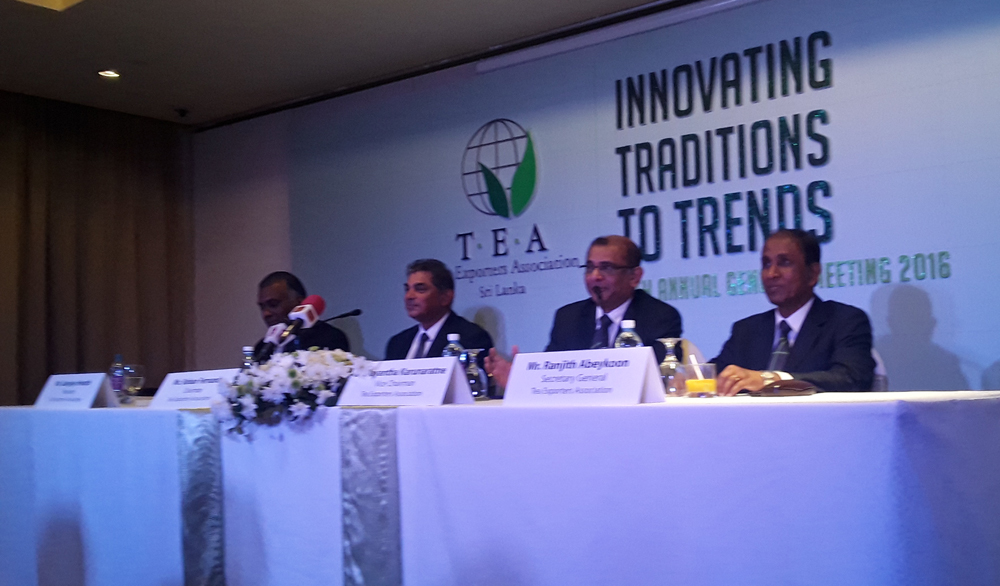October, 31, 2016

The Tea exporters Association (T.E.A) recently held a press conference in lieu of its Annual General Meeting at the Cedar Room of Cinnamon Grand Hotel amidst the newly sworn in management committee of the Tea Exporters Association. The press gathering was hosted primarily to announce the office bearers of the Tea Exporters’ Association for the year 2016/2017 and also to give an analytical view of the current issues affecting the tea export sector in Sri Lanka.
The Tea industry, being one of the most valued economic contributors to the country, expects to achieve an estimated revenue of US$1.3bn by the end of this year with an estimated export volume of 280mn Kilos. This indicates a drop in terms of revenue and volume, as the industry concluded the year 2014 with a revenue of US$1.6bn through an export volume of 320mn kilos. The reduction in the tea crop has been identified as the major contributing component for the diminution in export volumes which has been severely impacted by factors such as the prevailing drought, restriction on the use of fertilizer due to reduction in the government subsidy.
On a global scale, the tea industry has seen growth in production during the last ten years by nearly 47% while Sri Lanka has grown by 5% only. If the growth in China which mainly produces green tea is excluded, the rest of the producer countries have recorded a growth rate of 14% in production. The stagnation in tea production in the country due to low productivity, inadequate re-planting and old plantation etc. are the contributory factors for low tea crop in Sri Lanka.
Russia and the Middle East stand as influential markets for the Sri Lankan Tea sector as 75% of its tea volume is exported to these countries. The western sanctions on Russia, low oil prices, political unrest and military conflicts in Middle East, trade restrictions that arise as a result of its economical fall, has weakened their buying power and have also contributed to the inhibition of growth of the tea export sector in Sri Lanka. The benefit of lifting of sanctions on Iran is yet to come as all Iranian banks are still under USA sanctions.
Markets such as China and Turkey also have very high demand for Ceylon tea. Though China has given a preferential rate of 7.5% to Sri Lanka , Turkey has an unattainable tax of 145 % imposed on them, therefore Sri Lanka is currently in the process of signing a Free Trade Agreements (FTA) with Turkey and China which will give the country a higher opportunity to exploit such markets. Further compounding this issue, the pricing structure for oil is also a vital component to improve the tea export sector in order to maintain healthy purchase levels for tea.
Amidst these challenging factors, the potential of the tea Industry still stands strong and tall, therefore the T.E.A has proposed the liberalization of tea imports in Sri Lanka as a key development strategy which would enhance the value addition to tea and also strengthen the export volumes. Speaking of this proposal, the immediate past Chairman of the Tea Exporters’ Association, Mr. Rohan Fernando said “In terms of growth, the maximum any industry could develop, are to its allowed limits. In the case of tea, there are a few limitation factors such as; the declining volumes and quality of tea as well as the exorbitant pricing for even poor quality teas through state intervened controls on imports. For the tea export industry to grow and take a substantial share of the global market, these shackle like impediments must be removed’’.
In his address at the press conference, the newly appointed Chairman of the Tea Exporters Association, Mr. Jayantha Karunaratne said ‘’ The opportunities for tea in the global market come in many forms and I believe that the way forward is by expanding our product and reach. While history and tradition do play a large part in the legacy of Sri Lanka’s tea industry, there is one question that comes to mind, have we evolved enough to meet the expectations of the new age consumer?. Our products, services, marketing, branding and sales need visionary thinking and unrestrained innovation if we are to continue holding onto our crown’’.
Other leading tea producing countries have evolved with the growth in technology and shifted to electronic trading systems while the traditional system of auctioning tea is still being practiced in Sri Lanka. As Sri Lanka will be celebrating 150 years of Tea Exports next year, the T.E.A proposes to automate the auction system which will aid in reducing procurement time and avoid mal practices at the auction gathering as the entire process will be conducted online.
With a challenging target of increasing tea exports to USD $5billion by 2020, the Tea Exporters’ expect extensive support from the Tea Board and the government as tea is still considered as a thrust industry offering incentives and facilities that are enjoyed by all other industries.
Video Story